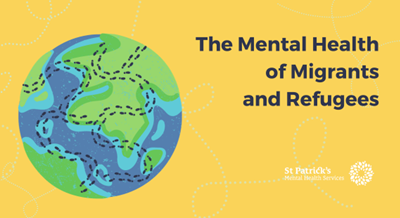Psychosis: A psychological perspective
When we think of psychosis, we are thinking of a number of experiences which can present in different ways for people. These include hearing voices, believing things that others find strange, speaking in ways that are hard to follow, and periods of confusion that appear out of touch with reality.
For people with psychosis, these experiences can happen a lot and/or intensely. The most difficult aspect of these experiences is often the distress associated with them.
Research in recent years has drawn attention to the commonality of these experiences. For example, it has been reported that up to 10% of the general population hear voices at some point in their life. Many people have beliefs that those around them find strange; for example, beliefs about alien abduction, ghosts, and being able to read the future. Nearly one in three people hold at least one belief that might be considered paranoid. Therefore, it is important to hold in mind that these experiences can be common within populations as a whole.
Research has drawn attention to a wide range of factors associated with the development of psychosis. These include childhood trauma, bullying, social exclusion, discrimination and inequality. Stress also appears to be an important factor in the development of psychosis, and it can impact on how we think, such as by becoming more self-conscious, more self-critical and more aware of risk and danger.
Research has also found that countries with greater gaps between rich and poor can have higher rates of psychosis and in places where ethnic minorities face high levels of discrimination. Early attachment experiences appear to play an important role in the development of psychosis. Inconsistent, absent or neglectful care can lead to insecure attachment which are associated with interpersonal and affect regulation difficulties.
Compassion-focused approach
The Psychology Department here at St Patrick’s Mental Health Services (SPMHS) is now accepting referrals for its Compassion-Focused Therapy for Psychosis (CFT-P) programme.
CFT-P is aimed at people with experiences of psychosis, such as paranoia or delusions. This includes people who have had a once-off experience of psychosis, such as in the context of a drug-induced experience. Within a safe and supportive group environment, participants are invited to develop greater understanding of, and compassion towards, their experiences of psychosis.
CFT-P offers a bio-psycho-social approach to understanding psychosis, informed by an evolutionary theory of compassion. This offers an additional set of tools to the medical/biological perspective for coping with psychosis.
CFT-P is a group-based, compassion-focused therapy (CFT) approach for adults experiencing distress relating to psychosis. CFT is an approach to psychotherapy aimed at reducing high levels of shame and self-criticism – factors that can maintain psychosis. CFT focuses on building a person’s motivation and capacity to relate to themselves and their difficulties with compassion. It also focuses on the development of feelings of safeness and soothing, and on learning how to cope with and reduce threat-based emotions.
The aims of the CFT-P programme are to:
- Explore a psychological understanding of psychosis
- Learn new ways of coping with emotional and psychological difficulties associated with experiencing psychosis
- Develop an increased sense of social safeness
- Reduce feelings of shame associated with psychosis
- Begin to develop self-compassion and reduce self-criticism.
Once a person is referred to the CFT-P programme, they are met with for an individual screening session to provide them with information about the group, and an opportunity to discuss whether the group would be a good fit for their needs.
The group itself consists of 11 weekly in-person group sessions, one individual review session and an end of group review to discuss next steps. It is run by a team of two psychologists and an assistant psychologist. The delivery of each group cycle is supported by weekly team meetings, external supervision with an international expert in CFT for psychosis, and regular team training. Approximately between six to eight service users take part in the CFT-P programme in each group cycle.
There are five key elements to the CFT-P programme. These include:
- Building social safeness
- Providing psychoeducation about how we work as humans, and how compassion can help us
- Helping people to develop some amount of formulation or understanding of their difficulties
- Cultivating a compassionate version of themselves
- Helping to direct or apply this compassionate self to current difficulties.
It is important to also note the benefits of working in a group as opposed to individually, giving service users an experience of shared compassion.
Following completion of the CFT-P programme, service users show higher rates of self-compassion compared to pre-intervention on the Compassionate Motivation and Action Scales (CMAS). The CFT-P programme allows service users to break down internal barriers, open up to emotions and become more compassionate with themselves. Service users have reported that the tools and exercises learned throughout the CFT-P programme have helped them when they are distressed.
The CFT approach is well-received and beneficial for service users. However, it is important that programme participants are at a place where they are ready to engage in psychology work; that is, not struggling with tiredness or low energy to the point that they can’t attend or engage in group sessions. It has been seen that CFT-P is often the first experience of psychology work for participants, and group members often express interest in engaging in further psychology work following CFT-P.
The next cycle of the CFT-P programme will begin on 24 September.
CFT-P is open to people with any experience of psychosis (for example, paranoia, delusions, hearing voices and/or dissociation) who are motivated to learn new ways of coping with these distressing experiences. The group is open to both outpatients and inpatients, and it is not necessary to have a diagnosis related to psychosis (such as schizophrenia) to participate - both those with and without such diagnoses are eligible to attend.
GPs can refer directly to this programme. Please note that the referrer retains clinical responsibility for the service user while they are attending an SPMHS day programme.
If you have any queries regarding an individual’s suitability for the CFT-P programme, please contact Ms Tara Deehan, Senior Counselling Psychologist, by phoning 01 249 3578 or emailing tdeehan@stpatricks.ie.
Continue to…
Referrals open for 2024 Compassion-Focused Therapy for Eating Disorders programme



